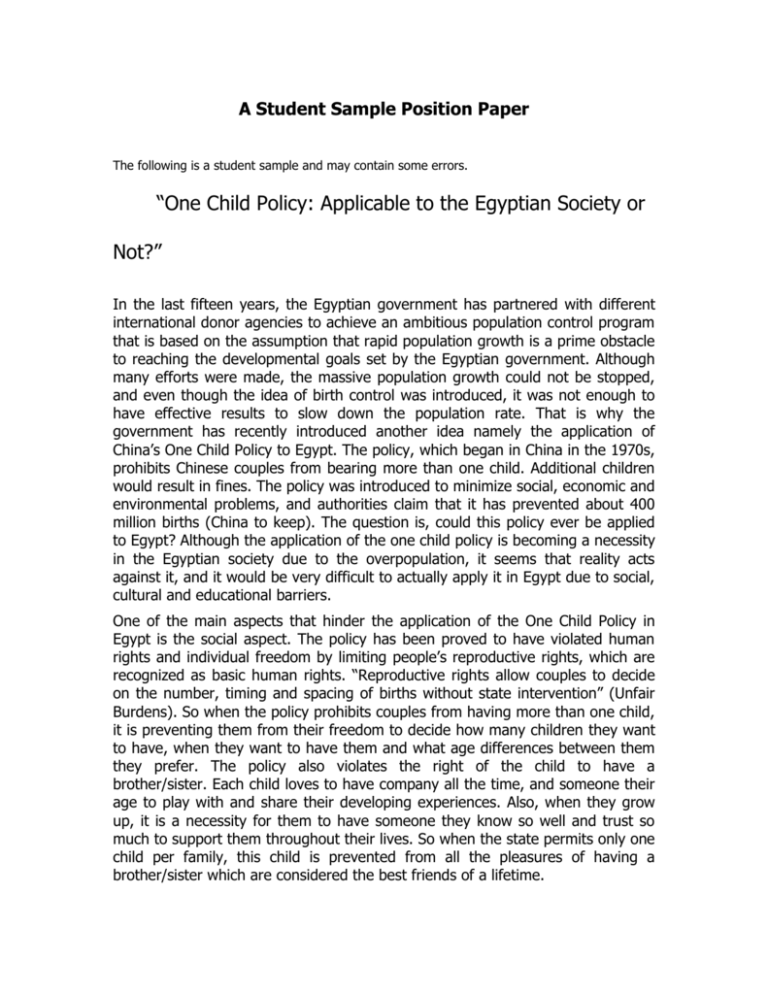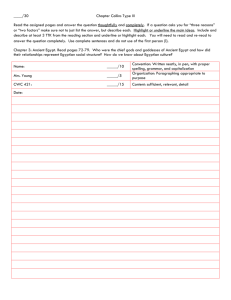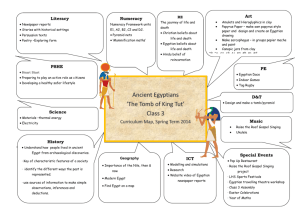One Child Policy in Egypt: A Position Paper
advertisement

A Student Sample Position Paper The following is a student sample and may contain some errors. “One Child Policy: Applicable to the Egyptian Society or Not?” In the last fifteen years, the Egyptian government has partnered with different international donor agencies to achieve an ambitious population control program that is based on the assumption that rapid population growth is a prime obstacle to reaching the developmental goals set by the Egyptian government. Although many efforts were made, the massive population growth could not be stopped, and even though the idea of birth control was introduced, it was not enough to have effective results to slow down the population rate. That is why the government has recently introduced another idea namely the application of China’s One Child Policy to Egypt. The policy, which began in China in the 1970s, prohibits Chinese couples from bearing more than one child. Additional children would result in fines. The policy was introduced to minimize social, economic and environmental problems, and authorities claim that it has prevented about 400 million births (China to keep). The question is, could this policy ever be applied to Egypt? Although the application of the one child policy is becoming a necessity in the Egyptian society due to the overpopulation, it seems that reality acts against it, and it would be very difficult to actually apply it in Egypt due to social, cultural and educational barriers. One of the main aspects that hinder the application of the One Child Policy in Egypt is the social aspect. The policy has been proved to have violated human rights and individual freedom by limiting people’s reproductive rights, which are recognized as basic human rights. “Reproductive rights allow couples to decide on the number, timing and spacing of births without state intervention” (Unfair Burdens). So when the policy prohibits couples from having more than one child, it is preventing them from their freedom to decide how many children they want to have, when they want to have them and what age differences between them they prefer. The policy also violates the right of the child to have a brother/sister. Each child loves to have company all the time, and someone their age to play with and share their developing experiences. Also, when they grow up, it is a necessity for them to have someone they know so well and trust so much to support them throughout their lives. So when the state permits only one child per family, this child is prevented from all the pleasures of having a brother/sister which are considered the best friends of a lifetime. The cultural views in Egypt also prevent the policy from being applied. Both culture and religion do not allow the One Child Policy due to various reasons. The first reason is inherited traditions. In many parts of Egypt, especially Upper Egypt, people have a tradition of giving birth to many children so that they can honor the family and carry the family name later when the parents die. Throughout the generations, this tradition was carried on and Egyptians got used to having many kids. So if the policy was applied, a revolution would probably happen against the government by the people to protect their rights and freedom. The second reason is the religious barriers. According to Al-Azhar Grand Sheikh Mohamed Sayed Tantawy, “the number of children a family decides to have is a personal choice, but he stressed that Islam requires families to take full responsibility of their children, and he stated that “Parents should only have children they can provide for” (Saleh). It is probably the most logical rule to abide with. The third cultural reason is family privacy. Families in Egypt have certain principles that they follow. Each family has its own life and different families do not interfere with each others’ business. Therefore, families do not allow any interference with their internal issues, especially the government interfering with the number of children a couple wants to have. The educational issues also represent major obstacles that hold back the one child policy from being applied in Egypt. Poor education and illiteracy are probably the main reasons why people do not have enough awareness to know the draw-backs of overpopulation, so it is not expected from them to understand a policy which according to them is an interference with one of their most private matters and takes away one of their most significant rights. For example, illiterate families sometimes do not care about educating their children, as they become a helping hand in the daily struggle for a better standard of living, which is a reason many experts give for large families. Therefore, many poor families do not care about the education privileges that accompany the One Child Policy, which include that the child’s education fees would be covered by the government. “The Central Agency for Public Mobilization and Statistics (CAPMAS) also indicates that poor families are more likely to give birth to many children (6 children per family), while the rate stands at 4 kids in educated families and middle- income families” (El-Naggar). Some Egyptian families consider their children their only investment in life, since they don’t have other goals to reach but to raise their children properly, so they are sure to teach them whatever trade or profession they can go on with. That is why illiteracy goes on for generations and the idea of many kids goes along with it. Opponents’ claims still have to be mentioned though. Applying the policy would be beneficial in terms of limiting population growth, aiding economic development, and improving the health and safety of women and children. Also, applying the policy would give people a chance to raise their income and their living standards, and would reduce the percentage of unemployment in the country due to the lower population. However, there would be concerns about demographic and sex imbalance, the psychological effects for a generation of only children in the city and how women would always be considered as the lower sex, despite the government’s efforts to change that. Also, economically, it is more rewarding for families without formal jobs and thus without pensions to have more children so that they can depend on them later on when they grow old. That is also another barrier that would stop the One Child Policy. After listing just a few aspects that act as barriers to the One Child Policy, it can clearly be seen that the policy would face many kinds of problems before it could ever be applied in Egypt and that is due to the different culture and traditions of the Egyptian society. Therefore, Egyptians should try to study their life states a bit more and try to be more aware of the consequences of overpopulation and act upon the rules so that the government would not be forced to finally apply a policy that would interfere with every single family’s private life and limit their rights.








